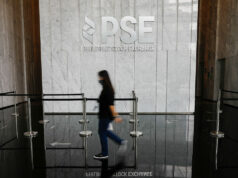Peso sinks to fresh trough on dollar demand, geopolitical concerns
THE PESO finished the week at a new low against the dollar on the back of strong corporate demand, with zero signs of intervention from the central bank and amid heightened geopolitical concerns offshore.
The peso closed at P51.49 versus the greenback on Friday, slumping 13.5 centavos from Thursday’s finish of P51.355 per dollar.
Friday’s close was the local unit’s weakest in nearly 11 years or since it ended at P51.60 a dollar on Aug. 24, 2006.
The peso traded weaker the entire session after it opened at P51.45 against the dollar. Its best showing was at P51.39, while its intraday trough was at P51.63 versus the greenback.
Trading volume was at $1.006 billion, soaring from the $688 million that changed hands in the previous session.
One trader attributed the dollar’s strength against the peso to strong demand from corporates.
“There were a lot of corporates buying the dollar. For one, oil companies are still buying, so it’s very significant and that’s the reason why dollar peso is still supported,” the trader said by phone.
“We have always seen corporates buying on the peso’s dip,” the trader noted.
The trader added that the Bangko Sentral ng Pilipinas (BSP) has not been present in the market for the past few days.
“We don’t see the BSP usually offering at a certain level. The BSP was not there,” the trader noted.
As regulator of the Philippine financial system, the BSP sometimes steps in currency trading to temper any sharp swings in the peso.
For his part, BSP Governor Nestor A. Espenilla, Jr. told reporters on Friday that the exchange rate will not “free-fall,” as domestic fundamentals remain strong.
“[The] peso market [is] determined. It will move up then down. It will not free-fall, it will take care of itself because the economic fundamentals are strong,” he said.
An analyst from a local bank, meanwhile, attributed the peso’s weakness to tensions offshore.
“The Barcelona terrorist attack and the US policy paralysis under Donald Trump has largely contributed to the peso’s weakness today,” Ruben Carlo O. Asuncion, chief economist at Union Bank of the Philippines said in an e-mail on Friday.
Reuters reported over 100 people were injured while 13 were killed after a suspected Islamic State militant drove a van into crowds in Barcelona, Spain on Thursday afternoon.
Meanwhile, US President Donald J. Trump had decided to disband the American Manufacturing Council and the Strategic and Policy Forum, raising questions on the US leader’s ability to organize the business community.
“Overall, market players were responding to the chaos brought about by the external environment,” Mr. Asuncion said. – Janine Marie D. Soliman



